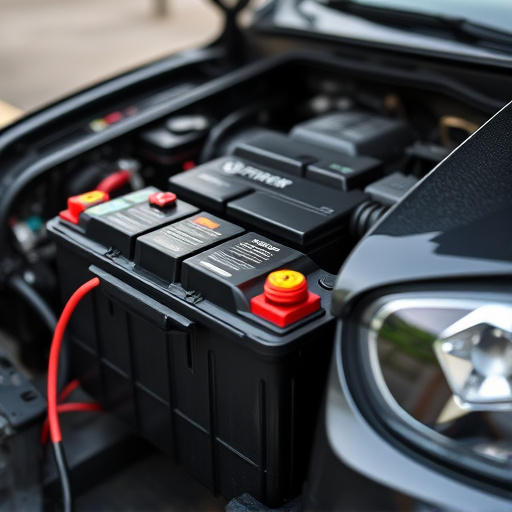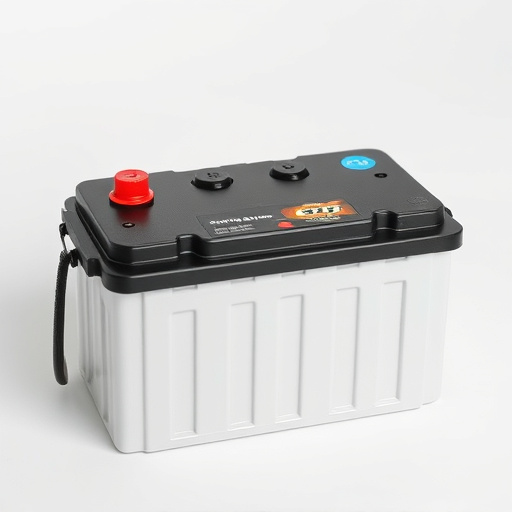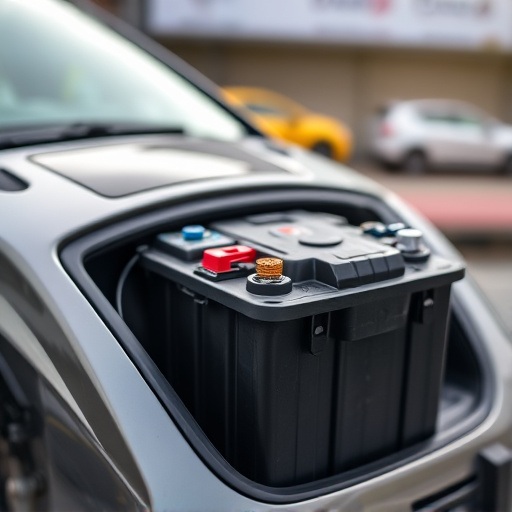When replacing your car battery, responsible recycling is vital to protect the environment and public health. Car batteries contain hazardous substances like lead and acid that can cause soil and water contamination if improperly disposed of. Auto stores and service centers offer convenient battery recycling programs, while local waste management facilities often have dedicated collection points. Utilizing these services minimizes toxic material in landfills and adheres to environmental standards. The choice between DIY removal or professional services depends on skill level, time availability, and budget. Local governments and organizations promote efficient battery disposal, offering drop-off locations and recycling programs to prevent water contamination, soil pollution, and explosion risks.
In today’s world, responsible battery disposal is crucial as these common components contribute significantly to environmental pollution if not handled properly. If you’re considering a replacement of your car battery or exploring safe disposal methods, this article is for you. We demystify battery recycling, bust popular myths, and guide you through the top 5 safe methods. Learn about the benefits of professional vs. DIY removal and discover local resources dedicated to efficient battery disposal, especially when replacing your car battery.
- Understanding Battery Recycling: Why and When to Replace Your Car Battery
- Unpacking Common Misconceptions About Battery Disposal
- Top 3 Safe Methods for Responsible Battery Recycling
- Do-it-Yourself vs. Professional Battery Removal: Pros and Cons
- Local Resources and Initiatives for Efficient Battery Disposal
Understanding Battery Recycling: Why and When to Replace Your Car Battery

In today’s world, where environmental consciousness is on the rise, understanding proper battery disposal becomes paramount. Car batteries, in particular, pose a unique challenge due to their toxic components and significant impact on the environment if not handled correctly. When considering a replace car battery, it’s crucial to recognize that these batteries contain lead-acid, which can leach into soil and water if improperly discarded. Instead of contributing to this issue, embracing eco-friendly practices by recycling old batteries is key. By doing so, we mitigate environmental harm and ensure valuable materials are reclaimed for future use, fostering a circular economy.
Unpacking Common Misconceptions About Battery Disposal

Many people believe that disposing of a car battery is as simple as taking it to the local landfill or trash collection point. However, this common misconception could lead to serious environmental hazards and safety risks. Car batteries contain harmful substances like lead and acid, which can contaminate soil and water sources if not handled properly. Furthermore, the recycling process for these batteries is crucial to prevent these hazardous materials from ending up in landfills where they can cause long-lasting damage.
When considering a replace car battery, it’s essential to understand that responsible disposal goes beyond simply finding a place to dump it. Many auto parts stores and service centers offer battery recycling programs, making it convenient for consumers to dispose of old batteries safely. These programs ensure that batteries are recycled or reused according to environmental standards, preventing toxic materials from posing a threat to public health and the planet.
Top 3 Safe Methods for Responsible Battery Recycling

When considering how to dispose of old or used batteries, responsible recycling is paramount for environmental protection. Thankfully, several safe methods exist for properly disposing of and recycling batteries, especially after a car battery replacement. Firstly, many auto parts stores and service centers offer battery recycling programs as part of their services, making it convenient for customers to drop off old batteries. These establishments are equipped to handle various types of batteries responsibly, ensuring they’re recycled or disposed of according to environmental regulations.
Secondly, local waste management facilities often have specific collection points or events dedicated to hazardous waste, including used batteries. Keeping an eye out for such initiatives allows individuals to dispose of car batteries safely and legally. Additionally, some communities have established battery recycling programs where residents can drop off old batteries at designated locations, contributing to a more sustainable future by reducing the environmental impact of improper battery disposal.
Do-it-Yourself vs. Professional Battery Removal: Pros and Cons

When it comes to removing old or damaged batteries, there are two primary approaches: DIY (do-it-yourself) and professional services. Choosing between the two depends on various factors, each with its own advantages and disadvantages.
DIY battery removal can be a cost-effective solution for those comfortable with handling such tasks. It allows individuals to manage their old car batteries responsibly without external help, aligning well with eco-conscious goals, especially when recycling. However, DIY methods may require specific tools and knowledge to ensure safety during the replacement process, such as properly disconnecting power sources. On the other hand, professional battery removal services offer convenience and expertise. They are ideal for those who lack the time or skill to handle it themselves. Professionals employ specialized equipment and training to safely dispose of old batteries, adhering to environmental regulations, but at a cost that may be higher than DIY options.
Local Resources and Initiatives for Efficient Battery Disposal

In many regions, local governments and environmental organizations have taken initiative to promote efficient battery disposal, particularly for commonly discarded items like car batteries. These resources often provide convenient drop-off locations and collection events where residents can responsibly dispose of their old or unused batteries. Some communities even offer recycling programs that facilitate the proper handling of these hazardous materials, ensuring they don’t end up in landfills.
When considering a replace car battery scenario, it’s advisable to take advantage of these local initiatives. This not only contributes to a cleaner environment but also ensures that you’re disposing of old batteries safely and in accordance with regional regulations. These programs play a crucial role in mitigating the potential harm caused by improper battery disposal, such as water contamination, soil and groundwater pollution, and even explosion risks.
When considering a replacement car battery, it’s crucial to remember that proper disposal is just as important as responsible recycling. By understanding the safe methods outlined in this article—from separating batteries properly to utilizing local resources—you can contribute to a more sustainable future. Remember, small actions like these can make a significant impact on our environment. So, whether you choose to handle battery removal DIY or opt for professional services, ensure it’s done safely and responsibly.
